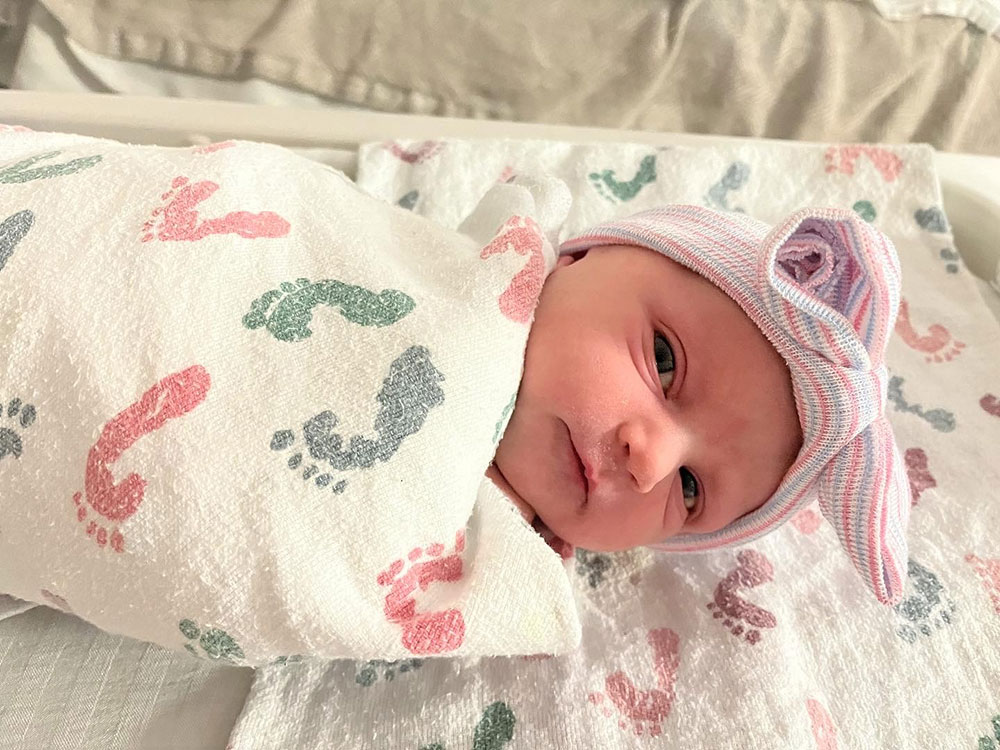Leah’s miracle baby: Maternity staff’s quick response to a terrifying delivery
- Category: General, Maternity Care
- Posted On:
- Written By: Boulder Community Health

“I feel extremely cared for and special to have come out of that with my child in my arms.”
The day that Leah Carpenter’s daughter came into the world was one of the happiest for the third-time mom—but it was also the single most terrifying one. For on that day, Leah knows how close the birth of little Selah came to ending in tragedy.
“She’s my little miracle,” Leah says of her now five-month-old daughter.
Leah had planned to have a low-intervention childbirth and chose Foothills Community Midwives, where expecting families can deliver their newborn in the comfort and safety of the Family Birth Center at Foothills Hospital. Certified nurse-midwife Martine Tesone, CNM, happened to be on call the day when Leah started having contractions.
“Martine wanted me to go to Foothills Hospital at seven minutes between contractions.” When she hit that mark, Leah and her husband, Rob Carpenter, made the 20-minute drive from their home in Longmont to the Family Birth Center at Foothills Hospital and arrived around 7 p.m. on Saturday, Nov. 26, 2022.
“Once I was admitted, Martine did an exam to determine how far dilated my cervix was,” Leah explained. “She said she could feel something in front of the baby’s head but wasn’t sure because my water was still intact.” About 20 minutes later, as Leah recounts, her water broke.
“As soon as my water broke, Martine came in and did another exam. That’s when all chaos broke out,” says Leah.
Martine informed Leah that she had umbilical cord prolapse, a rare complication of pregnancy in which the umbilical cord drops into the vagina ahead of the baby. It occurs about 0.3 percent of the time, or 3 in 1,000 births. When this happens, the cord can become compressed, decreasing the baby’s oxygen supply. Immediate delivery is critical to avoid problems such as brain damage or death.
Suddenly, the room was filled with a sense of urgency.
“Since I was only 8cm dilated at the time, Martine told me that I needed to push with all my might to get this baby out right now. I was just going to get this baby out of me,” Leah recalls, “because that’s what Martine told me. But I could sense she was uneasy. There was just something not right in the room.”
 Selah was born about 10 minutes later, at 9:10 p.m.
Selah was born about 10 minutes later, at 9:10 p.m.
“When my daughter came out, she was blue and limp. She was not breathing or crying,” Leah says with a quiver in her voice.
BCH’s maternity staff took Leah’s baby quickly to the observation table.
Maternity nurse Alia Westlund, who had been a previous ICU nurse, stayed by Leah’s side and knew exactly what to say to her. “She helped calm me from the chaos in the room. She was really experienced in urgent and emergency situations and was just so helpful.”
Leah adds, “I remember lying there shaking uncontrollably, sobbing—just waiting, praying, and crying for her to have her first little cry and all the sudden, maybe a minute or a minute and half later there it was. The most beautiful sound I have ever heard. We heard the little cry, and that was just a wave of relief.”
Martine says, “Thankfully, all the best staff and being in a hospital environment allowed for safe intervention and ultimately a good outcome.” She adds, “This birth will be extremely memorable for me. I've been practicing as a midwife for 13 years and never had a cord prolapse situation before. We are all so grateful for the teamwork and wonderful outcome!”
And looking back now after it's all over, Leah said, “I am just so grateful that I had the team that I had, especially Martine. She made all the right decisions and somehow delivered this baby under really scary circumstances. With the decisions Martine made, she kept me and my baby safe.”